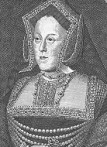The divorce
Catherine's marriage to Henry produced only two live children (four were stillborn): a son who lived two months, and a daughter, Mary.
Henry may have felt that he was being punished by God for an improper marriage (see the previous page); in any case, he officially requested a divorce in 1527, after he fell in love with young Anne Boleyn*. The proceedings continued for nearly seven years, and became known through polite circumlocution as the king's "great matter." During this time Henry, with the help of Cardinal Wolsey tried in vain to obtain permission from the Pope for a divorce, and when negotiations finally failed he decided to break with the Church of Rome.
A modern speculation on the real cause of Henry's troublesome "great matter".*
Politics and the divorce
It was not unreasonable for Henry to believe that a male heir was needed in order to continue the Tudor dynasty and ensure government stability, since it was doubtful that female succession to the throne would be accepted. The only precedent for a woman as ruler was the unfortunate case of Matilda in the 12th century, a reign which ended in civil war and usurpation.
The country was just beginning to recover from the economic chaos of the previous civil war, the Wars of the Roses, and the thought of a leader who could be challenged was intolerable. The same debate raged in Elizabeth's reign, as her counsellors urged her to marry.
As well as his desire for the divorce, there was a strong financial incentive for Henry to deny the authority of the Pope--the money to be gained from the dissolution of the monasteries.
Footnotes
-
Henry's illicit marriage
Henry secretly married Anne in May of 1533, some months before Thomas Cranmer, Archbishop of Canterbury, granted a divorce between Henry and Catherine. The marriage between Henry and Catherine was retroactively declared unlawful, and as a result their daughter Mary was proclaimed a bastard. Anne was crowned a month later.
-
A modern speculation
The deaths of so many of Catherine and Henry's children is a sober reminder of the mortality rate in the period, even for those with the best of care. We may speculate that the cause of their misfortune may have been the result of incompatible blood types, or something of the kind; certainly Henry had live children with other partners, though later in life he probably had syphilis, and became impotent.
In any case, the blame for not producing a male child was seen as Catherine's--the responsibility of the male in providing the crucial X or Y chromosome was not discovered for another 400 years.
